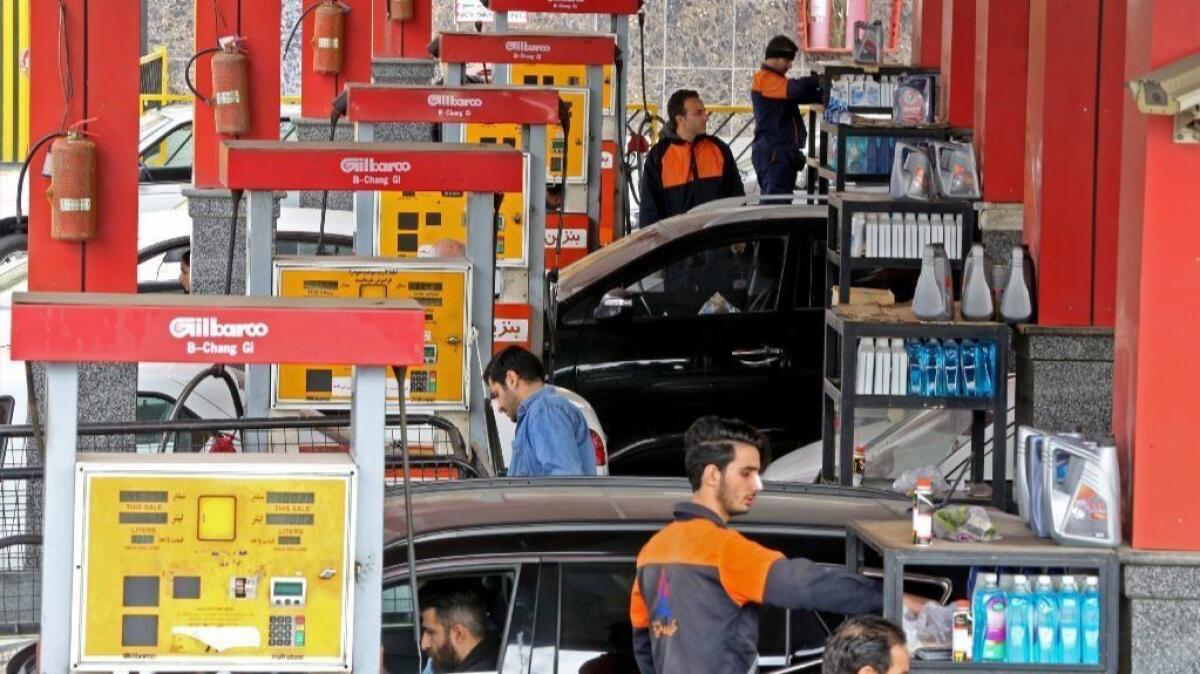Trump administration ends waivers for purchases of Iranian oil

The Trump administration said Monday it would not extend exemptions to its ban on imports of Iranian oil, exposing five countries, including several U.S. allies, to potential sanctions as early as next month.
Secretary of State Michael R. Pompeo, who announced the move, did not specify which sanctions are under consideration or say how quickly they might be imposed.
But the effort to choke off Iran’s exports of crude oil risks friction with China and India, the two largest oil importers from Iran, and could threaten U.S. trade negotiations or other business deals with several governments.
The price of crude oil spiked 3% after the announcement, a six-month high.
Iran’s foreign ministry dismissed the sanctions as illegal and said it attached “no value or credibility” to the waivers.
Speaking at the State Department, Pompeo said the United States, Saudi Arabia and the United Arab Emirates would step up petroleum production to ensure “appropriate supplies” are available on global markets to make up any shortfall and keep energy prices stable.
“I want to emphasize that we have used the highest possible care in our decision to ensure market stability,” he said.
If shortages emerge, gas prices could rise for U.S. motorists as summer road trips — and the 2020 presidential campaign — approach.
Last year, after President Trump said he was pulling out of the 2015 Iran nuclear accord, the White House said it would impose sanctions on countries that continued to import Iranian oil.
It granted waivers to eight major importers, allowing them six months to find alternatives and to avoid shocking oil markets. The waivers expire May 1.
The governments include U.S. allies India, Japan, South Korea and Turkey, as well as China. Rounding out the list are Italy, Greece and Taiwan, which reduced their imports to zero in the last six months.
The importing governments had expected an extension of the six-month waivers and several expressed anger at the administration’s decision.
Swift compliance with the U.S. demands “will be difficult, if not impossible, to achieve,” Gerald Feierstein, senior vice president of the Middle East Institute, a Washington think tank, said in a blog.
“Beijing has already denounced the U.S. decision and … the other four will likely also push back against the U.S. decision in the coming days,” he said.
The Trump administration wants to force Iran to negotiate a deal that not only would block nuclear activities, but also its ballistic missiles and what U.S. officials call its “malign behavior” across the Middle East. Iran has shown no sign of complying.
U.S. sanctions and declining oil prices have led to a sharp downturn in Iran’s economy, sending inflation soaring, driving away foreign investors and triggering protests.
“We are going to zero [imports] across the board,” Pompeo said Monday. He said the goal was to squeeze Iran’s economy further and force the government in Tehran to change its policies.
The administration accuses Iran of supporting militant groups such as Hezbollah in Lebanon and the Houthi rebels in Yemen, where they are battling a Saudi-led, U.S.-backed coalition for control.
Pompeo said sanctions had deprived Tehran of $10 billion in revenue in the last six months. Before then, he said, oil exports provided up to 40% of the Islamic Republic’s revenue — as much as $50 billion annually.
Saudi Arabia stands to profit from a cutoff of oil exports from Iran and Venezuela, where the Trump administration has issued sanctions in a bid to unseat the government in Caracas.
In a statement, the Saudi minister for oil and energy, Khalid Falih, said the kingdom was “closely monitoring” oil markets and would continue its “long-standing policy of working towards oil market stability.”
“Saudi Arabia will coordinate with fellow oil producers to ensure adequate supplies are available to consumers while ensuring the global oil market does not go out of balance,” he said.
Earlier this year, Saudi Arabia and other members of the Organization of Petroleum Exporting Countries and its allies, including Russia, had agreed to cut oil production. Global prices have risen since then.
India, which has imported about 10% of its fuel from Iran, said it was “studying” the U.S. move. Indian Foreign Secretary Vijay Gokhale had sought to persuade the Trump administration to give it more time, Indian media reported.
South Korea also sought a reprieve. Finance Minister Hong Nam-ki this month petitioned U.S. Treasury Secretary Steven T. Mnuchin, saying Seoul was looking for alternative energy sources but that “it’s not an easy situation.”
China has said it opposed the unilateral U.S. sanctions. “Our cooperation with Iran is open, transparent, lawful and legitimate; thus, it should be respected,” the Chinese Foreign Ministry said in a statement Monday
“The point of this is not to negatively impact other countries,” Brian Hook, the State Department’s special representative for Iran, told reporters.
“This is the biggest leverage we have on the Islamic Republic of Iran, their oil exports,” Hook said. “And if you want to seek a change in behavior, you have to show seriousness of purpose on the oil.”
Critics said they doubt Iranian leaders would respond in any way that would be satisfactory to Washington.
Several European allies, who have stayed in the Iran nuclear accord, say the Trump administration’s campaign is designed to push Iran into violating the deal, which has successfully curtailed Tehran’s nuclear ambitions since it was signed in 2015.
Iran said it remained in “constant talks with [Tehran’s] international partners including the Europeans.”
For more on international affairs, follow @TracyKWilkinson on Twitter
More to Read
Start your day right
Sign up for Essential California for news, features and recommendations from the L.A. Times and beyond in your inbox six days a week.
You may occasionally receive promotional content from the Los Angeles Times.







